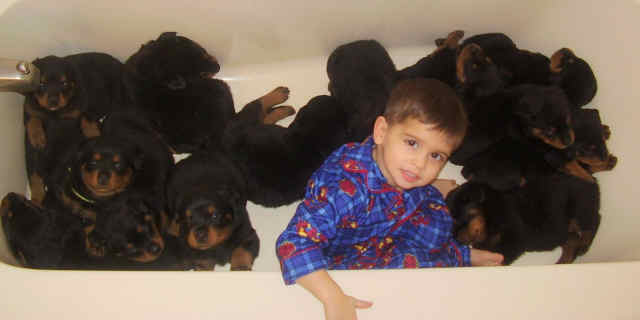All of the information provided on this website is gathered from my personal experience and research. It is put here to try and inform and educate but is NOT meant to provide or replace advice from your veterinarian. Always consult your vet if you have any health concerns for your dog or puppy, or you may contact Guardian Rottweiler’s vet, Dr. Jeff Udrasols of Meridian Veterinary Clinic at 317-888-4405. We HIGHLY recommend this vet to anyone in the area. I strongly believe that finding the correct vet is like finding the correct pediatrician- it must be someone who is not only competent in their job, but also someone who genuinely caring about what is important to me- my babies. All of the staff at Meridian Vet. Clinic are friendly and well informed and always have my dogs best interest first and foremost. Dr. Udrasols not only his highly knowledgeable in his profession but also in the Rottweiler breed and of course with our dogs who have been seeing him for generations.



NUTRITION
All puppies will be completely weened and on dry dog food before they leave my home. All of our dogs are on a rotational diet including RAW foods and FROMM Large Breed Puppy. If you do decide to use a different brand, please make sure that it is for large breed puppies. Your Rottweiler will grow at a tremendous rate her first year of life and you will need a dog food that can provide the proper nutrients for her joints and organs, specifically the heart. Your Rottweiler will need to be on a large breed puppy formula for 2 YEARS. If you plan on switching you puppy to a different brand of dog food, YOU MUST DO SO GRADUALLY, Following the recommendation on my Available Puppies page. Failure to properly switch you puppy’s food could result in diarrhea and/or vomiting.
I am often asked, “how much do I feed?” There are guidelines on your bag of food, but your puppy and her body condition is your best indicator. If he inhales all the food the minute you put it down and does not look like a keg with legs, then you should increase the amount of food. Typically, I suggest to leave the food out for about 20 minutes and whatever the puppy eats in that time frame is a good indication of what he needs. Keep in mind that your pup’s needs will change as he grows, so you will need to monitor how much he needs and use the suggest amount as a guideline only. Do not forget that as soon as he finishes eating he will need to “go potty.”
Some prefer to leave the food out all day and allow their dog to “graze.” If this works best for your dog that is okay too. But for puppy’s having difficulty with the potty training, regulating their intake schedule will regulate their output schedule. Leaving the food out can also sometimes lead to picky eaters. I recommend continuing to feed 3 times a day until your puppy is about 16 weeks, then you can decrease to twice a day.
HEALTH
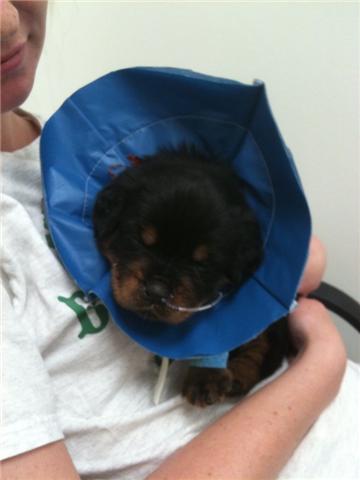
When puppy proofing your home, one of the most important things to be aware of are the toxins. Besides the things we would all consider to be toxic, there are many foods and household items that can also be poisonous. Be aware of the signs of poison: trembling, drooling, vomiting, and diarrhea. Here is a list of some of the most common TOXINS. As that list does not encompass every plant, here is a wonderful tool for looking up plant toxins: http://www.aspca.org/pet-care/poison-control/plants/.
Before you puppy leaves, she will have had at least 2 dewormings and her first set of shots consisting of : Distemper, hepatitis, parainfluinza and parvovirus, and bordetella. We recommend getting your puppy started on a monthly flea/tick preventative and heartworm preventative at the first vet visit. It is very important to keep up with the monthly flea/tick preventative as well as the monthly heartworm preventative. Aside from being extremely annoying, fleas, ticks and mosquitoes carry deadly diseases.
Lyme Disease is transmitted by infected ticks. An infected dog will often limp, her lymph nodes will swell, she will stop eating and have an elevated temperature. Lyme Disease can affect the heart, kidneys and joints or even lead to neurological disorders if left untreated. Even when diagnosed early and treated with antibiotics, relapses can occur months or even years later.
Heartworm is transmitted by mosquitoes. Just as the name suggests, worms infest the right side of the heart and pulmonary arteries (sends blood to the lungs). They have also been known to travel the rest of the body and invade the liver and kidneys. These worms can grow up to 14 inches long and when clumped together can block organs. Heartworm is treatable if caught early, however there are often no symptoms in the early stages. In the later stages, dogs may cough, have loss of appetite, trouble breathing and become lethargic.
I have also included a brief explanation of the vaccines your puppy/dog should receive and why.
Bordetella Bronchiseptica is a highly contagious bacterium that causes severe coughing, whooping, vomiting, and in rare cases, seizures and death. It is the primary cause of kennel cough. There are injectable and nasal spray vaccines available.
Canine Distemper is a virus that attacks the respiratory, gastrointestinal (GI), and nervous systems of dogs, wild canids, raccoons, skunks and other animals. Symptoms include: discharge from the eyes and nose, fever, coughing, vomiting, diarrhea, seizures, twitching, paralysis, and, often, death. There is no cure, but symptoms can be alleviated to allow the dogs immune system a chance to fight it off.
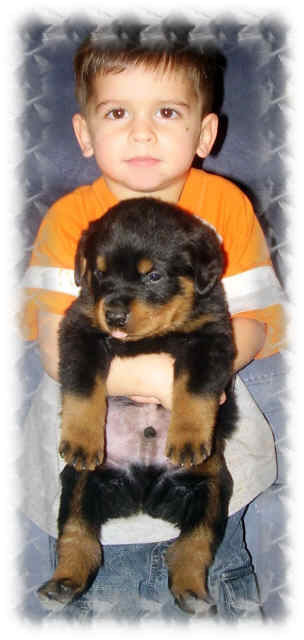 Parvovirus attacks the GI (gastrointestinal system). The major symptoms are vomiting, lethargy, and often severe, bloody diarrhea. Extreme dehydration can come on quickly and kill a puppy within 48 hours. Prompt veterinary attention is crucial! Again there is no cure, but by keeping the puppy hydrated and controlling the secondary symptoms, his immune system can have a fighting chance. Rottweilers are very susceptible to parvovirus. Extra care must be taken to ensure the puppy DOES NOT go anywhere common to other dogs (petstore, dog park, etc.) untill all vaccines for Parvovirus have been administered. And all Parvovirus shots must be given in a timely manor without delay.
Parvovirus attacks the GI (gastrointestinal system). The major symptoms are vomiting, lethargy, and often severe, bloody diarrhea. Extreme dehydration can come on quickly and kill a puppy within 48 hours. Prompt veterinary attention is crucial! Again there is no cure, but by keeping the puppy hydrated and controlling the secondary symptoms, his immune system can have a fighting chance. Rottweilers are very susceptible to parvovirus. Extra care must be taken to ensure the puppy DOES NOT go anywhere common to other dogs (petstore, dog park, etc.) untill all vaccines for Parvovirus have been administered. And all Parvovirus shots must be given in a timely manor without delay.
Rabies is a virus that invades the central nervous system causing headache, anxiety, hallucinations, excessive drooling, fear of water, paralysis, and death. Treatment within hours of infection or possible infection is essential.
Your puppy is the best indicator of his health. Although he cannot express verbally when something is wrong, his overall condition should. These are some general guidelines:
• Sudden loss of interest in favorite activities or lethargy
• Uncharacteristic potty accidents
• Limping
• Disinterest in food for more than 8 hours
• Sudden weight loss
• Persistent vomiting or diarrhea
• Lack of bowel movement for 48 hours
• Visible parasites in stool
• Increase in thirst and urination
• Profuse eye discharge or vision impairment
• Shakes head too much, especially if foul odor is present in ears or ear
canal is red/irritated
• Persistent coughing or wheezing
• Broken tooth or pawing at mouth
• Unusually foul odor in mouth
• Any abnormality in skin–a lump, areas of hair loss, severe itching, inflammation or oozing, or a sore that won’t heal
You should call your vet within 24 hours if your puppy has any of these issues. An abnormal temperature is another indication that something is not right. Your dog’s temperature should be between 99.5 and 102.5. Get to know your dog and what their “normal” temperature is as it will very between dogs. The temperature should be done rectally. High temperatures usually indicate an infection and a low temperature could be serious.
These are sighs of an emergency and you should call you vet IMMEDIATELY if you dog experiences any of the following:
• Trauma to head or body
• Deep bite or puncture wound–bites can become infected very easily
• Cut or would that won’t stop bleeding
• Seizure
• Weakness, disorientation, or loss of coordination
• Difficulty breathing
• Collapse or loss of consciousness
• Sudden swelling of the abdomen (all large breeds are susceptible to
potentially life threatening bloat.)
• Blood in urine or stool
• Body temperature over 103
Rottweilers will over heat very quickly in the heat. Dogs are unable to sweat to cool themselves and their black coat soaks up the sun. Learn the signs of overheating: rapid, heavy breathing, loss of coordination, fainting and vomiting; and the signs of dehydration: sunken eyes, thick saliva, dry gums, loss of skin elasticity (when you pinch the skin at the back of his neck it should quickly return to it’s original position. If it remains “pinched” you puppy is dehydrated.
DISEASES
These are some of the health concerns specific to Rottweilers and other large breed dog.
BONES/JOINTS
Hip Dysplasia is a genetic disease that affects most large breed dogs due to the incredibly fast growth rate. Canine Hip Dysplasia (CHD) afflicts millions of dogs each year and can result in osteoarthritis, pain, and even lameness. CHD has both genetic and environmental factors that can contribute the the likelihood of a dog developing hip dysplasia. The best way to help prevent the genetic component of this debilitating disease is to make sure that the dam and sire are OFA’d, PennHIP, or certified in their country. The pedigree’s of the sire and dam are also significant. One of our goals at Guardian Rottweilers is to try to help “breed out” many of the genetic diseases that plague Rottweilers. Although there is nothing we can do as breeders to prevent large breed dogs from growing at a crazy rate, we can and will do all we can to improve the factors that contribute to CHD that we do have control over. We can ensure that only the strongest bloodlines are bred and we can make sure that everyone who adopts a Guardian Rottweiler understands the impact that diet has to insuring they have the strongest, healthiest dog inside and out.
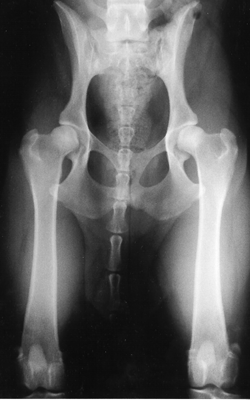
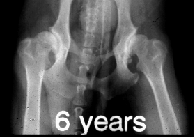
Above left: x-ray of normal canine hips. Above right: an example of severe hip dysplasia. This dog probably has moderate mobility loss at best.
Elbow Dysplasia is similar to hip dysplasia in that it too is a degeneration of the joint, specifically the elbow. Elbow’s can be certified as well in an effort to minimize the possibility of this defect.
While purchasing a puppy from a breeder who has had the hips and elbows certified and is producing from good pedigrees will lessen the chance of your dog developing hip or elbow dysplasia, it can not be guaranteed that you dog will not develop this or any other disease. CHD is a developmental disease meaning that it is not present at birth, but develops with age as do the other joint issues that plague large and giant breed dogs.
HEART
The most common heart problem in large breed dogs is Sub-Aortic Stenosis, or SAS. The best way to ensure that the dog to be bred does not have SAS or any other congenital heart defect is to perform an echocardiograph and have it read by a cardiologist. Click on the link to learn more about SAS.
JLPP
JLPP- Juvenile Laryngeal Paralysis & Polyneuropathy is a degenerative genetic disease that shows up when the puppy is around 3 months of age. It affects the puppy neurologically and the symptoms worsen until death or euthanasia. JLPP is 100% fatal. There is no cure. There is no known case of a JLPP puppy surviving, and most are dead by 6-7 months, if not sooner. JLPP IS 100% PREVENTABLE!! Please test click on the link and breeders, you MUST TEST ALL OF YOUR STOCK. Breeding 2 carriers will result in 25% of your pups dying a horrible, pitiful death.
DIGESTIVE
Bloat is a common condition in dogs with deep chests in which the stomach swells from gas, fluid or both. Bloat becomes a medical emergency when the stomach distends and then flips over, causing torsion. Bloat and torsion may be caused by over-eating, drinking large amounts of water after eating, and/or vigorous exercise after a meal (a full belly bounces around in the large chest cavity and is able to turn over on itself). Research suggests that you can help prevent bloat by feeding the dogs from a raised food dish and discouraging heavy exercise after eating. If you suspect bloat, you should call your vet or animal emergency clinic immediately immediately. On females that will be spayed, I always suggest that having the vet tack the stomach down at the same time (called a gastroplexy). The vet will already be in the area and most will be happy to go ahead and do that for you. It is a small step to take, but can prove to be invaluable as it will prevent the stomach from twisting on itself.
SKIN
Dry skin is not uncommon in dogs and the Rottweiler is no exception. If your dog has excessively dry or flaky skin and it is left untreated, it can lead to “hot spots.” This is where a dog scratches or licks at an area to the point of damaging the skin. If your dog develops a hot spot, you need to discourage the dog from scratching or licking that area to promote healing. Try Medicated skin relief products like Itchstick, available at most pet stores for about $6-7.00. It looks like a stick of deodorant. You apply it directly to the affected area. Itchstick contains ingredients to ease the pain and discomfort of the itch as well as bitter apple to discourage licking. If this does not help or the spot worsens, you may need to see the vet for hydrocortizone shots, antibiotics or an e-collar. (it’s that lamp shade looking thing that prevents them access to the area.)
A common cause of dry skin is lack of enough oil or fat in the diet. You can try adding salmon or fish oil to your dog’s diet if his food is lacking. If you dog is on a good, quality food, and your vet does not believe that this is the case, then he could be allergic to something in his environment. Try switching to an oatmeal shampoo, or even a medicated shampoo from the vet.
Some dogs and cats are allergic to fleas as well. Some topical flea/tick preventative will kill the flea if it bites, but for some dogs, all it takes is that bite to cause an allergic reaction. Try switching to a topical that repels the fleas or try this safe and easy homemade flea repellent:
Cut 6 lemons in half, boil in a quart of water, steep a few hours, then strain the solution into a spray bottle. Spritz your pet’s fur, taking care not to spray near the eyes. Don’t spray anything in a dog’s face; apply spray to the hand and then rub it on the fur. You can also try putting a drop of lemon oil or rosemary oil on the dog’s collar.
Dry skin can also be caused by the weather. Although your rottie will have the most fun in the winter playing is the snow, the cold, dry weather can also cause dry skin.
EYE
Dogs, especially those breeds that are “wet” (have loose–like the St. Bernard, Shar-Pei, Mastiff, etc.) can suffer from a hereditary eye condition called Entropian. The eye lids roll inward and the eyelashes irritate the eye. Imagine always having not just one, but many eyelashes rubbing your eye every time you blink. It can be corrected with surgery, but the dog should not be bred as this condition can be passed on. Ectropian is similar except that the eyelids roll outward. Both conditions are relatively easy to correct but must be addressed..
Other eye diseases that can affect your Rottweiler are Progressive Retinal Atrophy (PRA) and Central Progressive Retinal Atrophy (CPRA). These are inherited diseases that affect the retinal and cause blindness. Dogs used for breeding should be examined annually by a Board-certified Veterinary ophthalmologist, until at least eight years of age, as hereditary eye problems may not present themselves until later in life. Dogs examined by a Board-certified Veterinary Ophthalmologist and found to be free of hereditary eye disease may be registered annually with the Canine Eye Registry Foundation (CERF).
CANCER
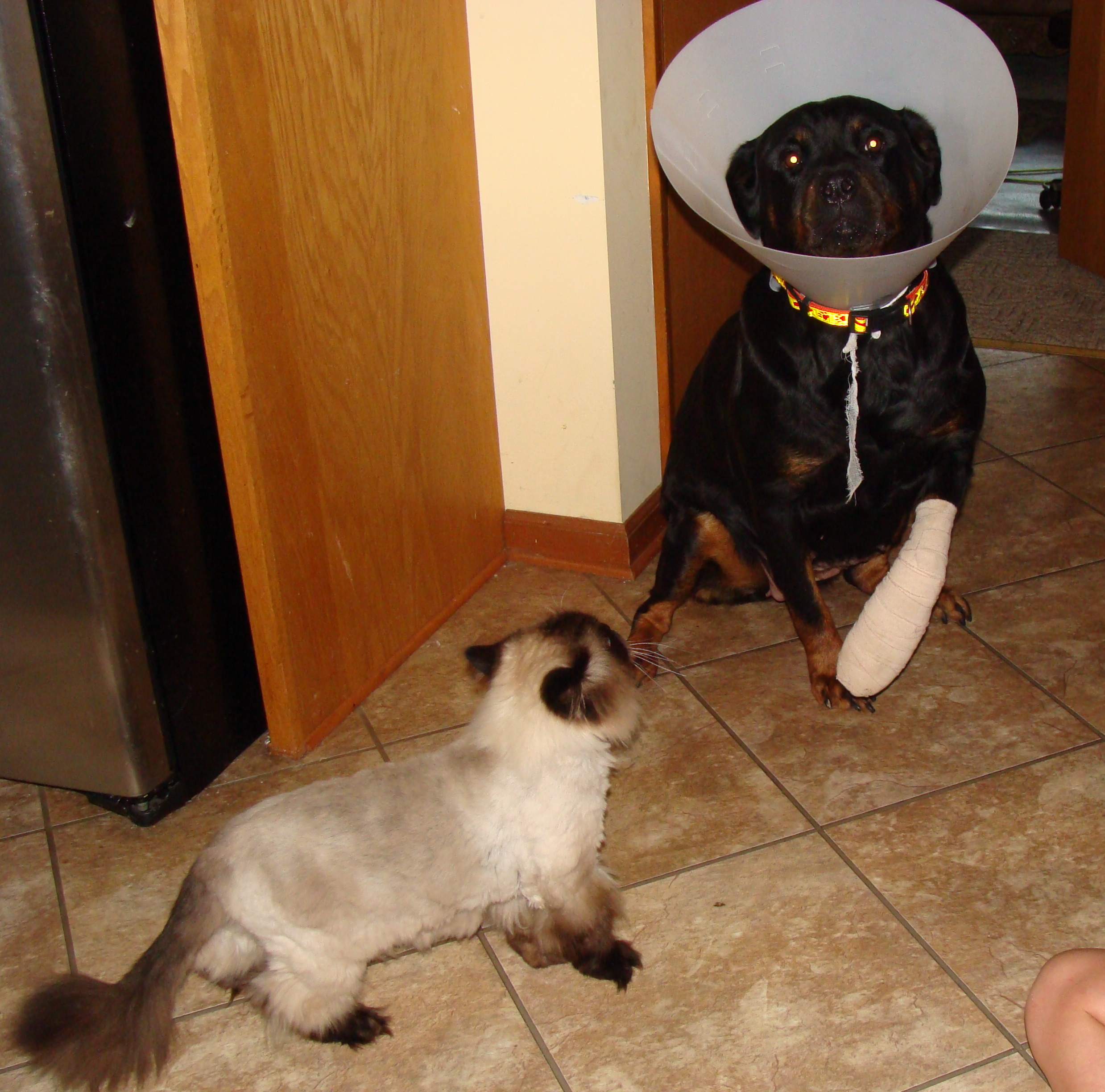
Cancer seems to be everywhere lately, and the Rottweiler is no exception. It is becoming an increasingly common condition in the Rottweiler breed, with bone cancer being the most frequent type. Any suspicious lumps, moles, sores or unexplained lameness should be investigated by your
veterinarian.






